When you start learning how to play the guitar, you may notice that certain chords and movements may seem completely impossible since they require your fingers to be impossibly long and elastic. As a result, you may wonder if guitarists need to have naturally long and strong fingers to play properly.
Guitarists don’t need naturally long or strong fingers to play the guitar. These qualities may help you as you learn how to play, but after some practice, they’ll make no difference. You can play the guitar just as well with short and thick fingers if you practice enough.
In the rest of this article, I’ll explain how long or strong fingers can help you to play the guitar, but also how they aren’t essential to your technique. Moreover, I’ll go over some effects that the guitar may have on your hands. Let’s get started!
Are Long Fingers Better for Playing the Guitar?
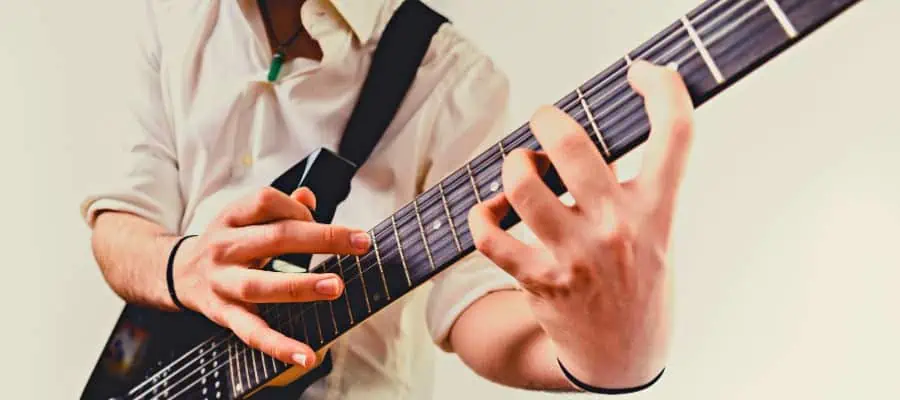
Playing the guitar involves using one hand (typically your left) to press the strings and the other to strum or pick them to create the right sounds. The fretting hand, especially, can be physically challenging because it may require your fingers to stretch and bend in a way that seems impossible.
Certain chords require your fingers in placements that can be hard to achieve. New guitar players cannot play these particular chords at first because their hands will not be physically capable of stretching. As a result, they may think they are not suitable to become guitarists in the first place and that only people with long and strong fingers can learn this instrument.
Naturally, long and strong fingers can be a great help when learning how to play the guitar, as they will make learning the chords much easier; they certainly provide an advantage as you’re learning. However, you will still need to apply the correct techniques; otherwise, your long fingers will still be unable to play the chord properly.
That said, long and strong fingers are not necessary to play guitar. Anyone can play, no matter what their fingers look like. If you see different famous or professional guitarists, you may notice that many have shorter and thicker fingers.
What if I Have Short and Thick Fingers?
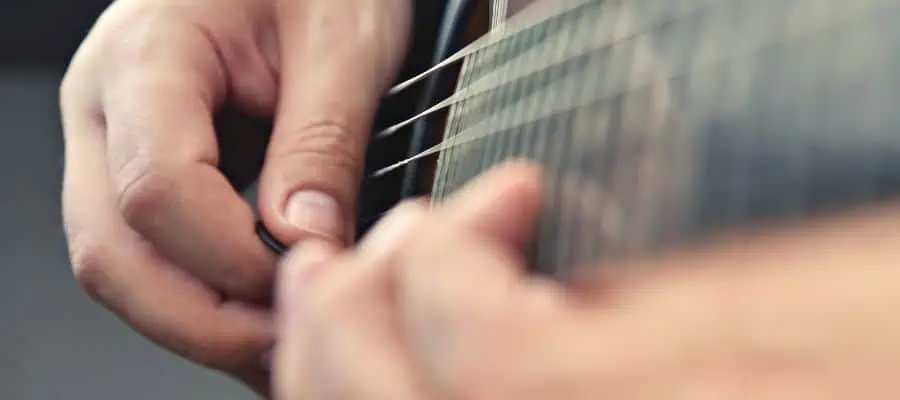
If you have short and thick fingers, it may be challenging to play some chords initially. However, this doesn’t mean that you can’t play; it just means that you need to continue practicing.
As you practice, your fingers become more elastic, and they gain the ability to stretch in ways that you thought were impossible before. The more you play, the easier it will be for you to play chords that were unreachable for you in the past.
You should be patient; just continue playing and attempt the different chords. Depending on how often you practice and how elastic your hands are, you can play even the hardest chords in a few months.
If you have short fingers, you will be able to learn how to play the guitar perfectly with enough practice, even if you find it incredibly hard to play certain chords at first. However, if you want to make things a bit easier for yourself as you learn, you may try to find guitars with thinner necks, which are more suitable for people with short fingers or small hands.
However, no matter the guitar, you can still be a great guitarist, even with short fingers. Just continue to practice and attempt all sorts of chords and movements that will make your hands more elastic. Soon, you’ll not notice any differences between chords, as they will be equally easy for you to achieve.
One of the best examples that shows the physical disadvantages should not hold you down is Tony Iommi. Not only does he have relatively small hands, but he also lost his middle and ring fingertips when he was younger. He started playing with prosthetic fingertips, which he made himself in order to follow his passion. He created his unique sound and style thanks to that accident, which led him to be one of the pioneers of heavy metal sound and playing style.
What Are The Finger Attributes A Guitarist Needs?
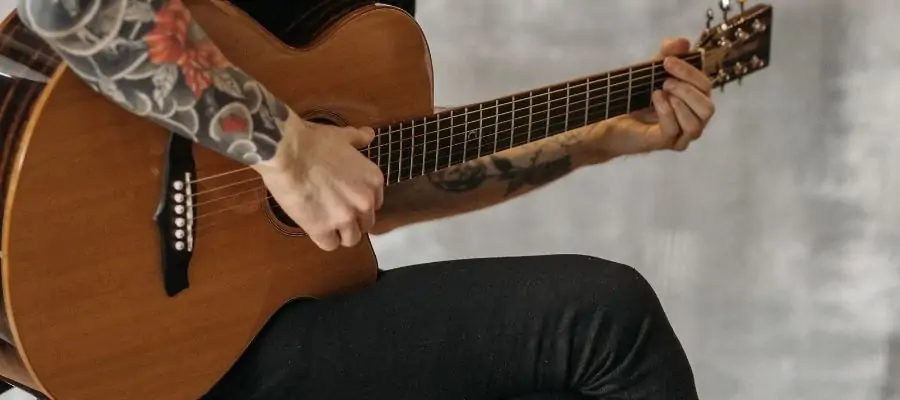
- Strength: Finger strength is crucial if you want to play the notes clearly without distortion or fret buzz. Developing finger strength, especially for the pinky finger, which often lacks the necessary strength, is important for any guitarist.
- Dexterity: Dexterity is crucial when moving fingers independently and accurately. For playing intricate melodies and complex chord progressions, dexterity is a must. You can develop it through daily practice sessions using exercises like the variations of the spider exercises.
- Flexibility: To play odd-shaped chords like barre chords, you will need your fingers to be as flexible as possible. Many people think long fingers are needed for those chords, but the trick is on the elasticity. Being able to stretch your fingers gives you great freedom to play any chord.
- Coordination: Coordination when playing complex finger patterns or fast licks is another key aspect, as it helps you with your timing and precision. This is heavily linked to muscle memory, which you will develop with weeks and months of practice sessions.
- Technique: Regarding the most important aspect, proper technique is more important than strength or length. Developing a good technique that acknowledges your physical advantages and disadvantages is the right path to being a great guitarist.
Why Is Strength Crucial?
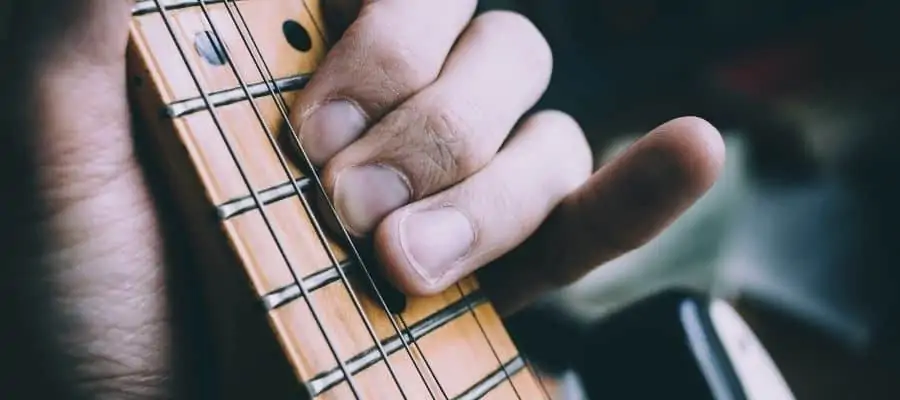
As mentioned above, long fingers are a great advantage, but they may be useless if you don’t use the necessary strength to play the chords. While the long fingers help with the placement, the strength of your hand helps with the pressure you apply. You should apply a certain level of pressure to press the strings to the fret to produce a clean sound.
Without strength, you’ll not be able to play the guitar properly because the sounds will come out distorted or with weird buzzing effects. No matter how hard you try to learn the placement of different chords, you will not be able to play them if you don’t apply the necessary pressure. Short fingers can play chords with practice, but weak fingers are more of a problem.
However, just like short fingers get more elastic, weak fingers also get stronger with practice. At first, you may find it hard to apply the right pressure, which may produce unsatisfactory results, but soon, your hand will automatically learn how to press on the strings. All you need is a lot of practice.
Also, by strong, I don’t mean you have to have Hulk Hogan-style fingers. You just have to be able to apply a good amount of pressure to the right positions to play the notes clearly. This level of strength can be achieved pretty quickly if you play regularly.
Does Playing the Guitar Change the Shape of Your Hand?
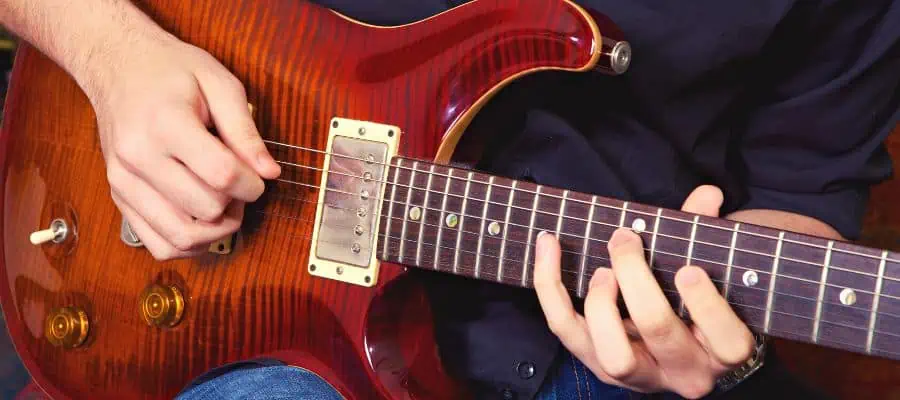
Considering everything I have explained, you may wonder if playing the guitar for a long enough time can have a visible effect on the shape of your hands. For instance, if you have short fingers, can they become longer if you play the guitar for a significant amount of time?
Experience has shown that playing the guitar will generally have little to no effect on how your fingers look. Still, it will have a significant effect on movement and elasticity. You’ll notice that you’ll be able to stretch your fingers much more than before. Moreover, your fingers will become quite strong with time.
The most noticeable change that playing the guitar can cause on your hands is the calluses. As you continuously press on the metal strings, your skin will get tougher on the fingertips to withstand the pressure. At first, you may feel pain and soreness in your fingers, and then you may see your skin peel, but soon enough, your fingertips will form calluses that will help you play much more comfortably.
Final Thoughts
As you can see, guitarists don’t need to have naturally long or strong fingers. These two attributes are sure handy when you’re a beginner, and you struggle to play certain chords. Someone with shorter fingers may have a harder time at this point, but after some practice, they will be just as good as someone with long fingers.
Playing the guitar will make your hands more elastic and stronger, but it may not have a visible effect on their appearance. The only difference you may notice is the calluses.
If you found this article useful, you may want to save this pin below to your Guitar board.

Recent Posts
When learning new songs have you noticed that some of the chord sequences sound really good? But when you tried to come up with your own chord sequence, or as we call it chord progression, you found...
Some guitarists insist on buying an expensive amplifier with their electric guitar. They assume that this is a must for every type of guitarist out there. However, in some situations, this isn’t...

